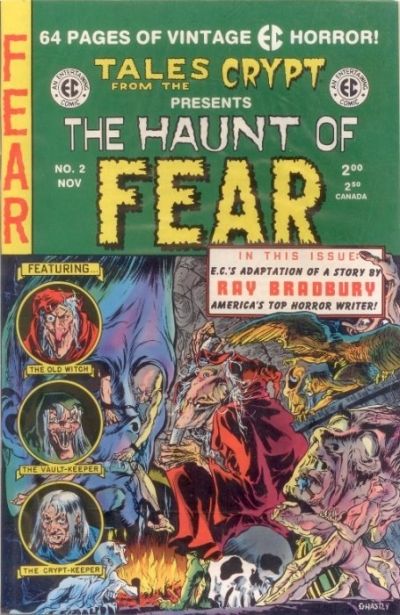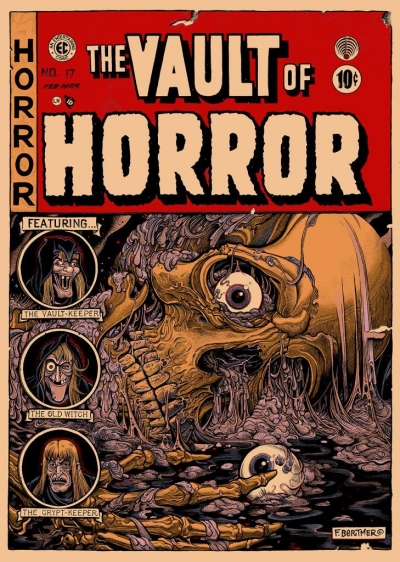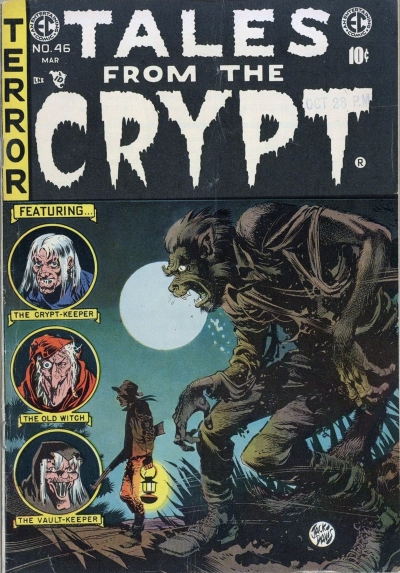Like many kids, my first true exposure to horror came through EC Comics. Throughout the 50s, EC revolutionized the comics industry by publishing titles such as Tales from the Crypt, Vault of Horror, Haunt of Fear, and others. No superheroes here but their titles ranged from horror to crime, science fiction to war.
What set EC apart from the rest of the industry was the art and the story telling. Jack Davis, Johnny Craig, Graham Ingles, Jack Kamen, Wally Wood: these were some of the best artists in the business. Their art was detailed, distinctive, and exciting. They outclassed most of the competition. Drawing inspiration from pulp magazines, publisher Bill Gaines and Al Feldstein came up with stories that were ahead of their time. They combined grisly horror with irony as well as tongue-in-cheek humor. So many of these tales are full of murderers, monsters, madmen, golddiggers, conniving femme fatales, misers, and heuristics that would make your head spin. The overall quality of EC's output made most of the other comics amateurish by comparison ( I've read comics from the 50s and while that may have been The Golden Age, it was the start of Batman's decline). EC became a part of Americana and is pretty much the reason why horror is revisited in comics over and over again. Thanks to Bill Gaines and his crew, they provided and still provide generations of artists, writers, and filmmakers with inspiration. The horror hosts (or Ghoulunatics), including the Cryptkeeper, have become beloved icons. Truly, EC is legendary but it was not always regarded with such reverence.
 Juvenile delinquency was on the rise during the 50s and comics became an easy scapegoat. Pop psychiatrists like Fredric Wertham made a case against comics saying that kids became criminals by reading them. It sounds ridiculous now but a lot of people bought into it ( maybe not so ridiculous because video games are blamed for mass shootings these days). EC became a target of Wertham and his ilk and Bill Gaines even became subject to a congressional hearing. He fought the good fight to protect himself and the industry but he failed. Here is a quote of Bill's testimony, "Some may not like them. That is a matter of personal taste. It would be just as difficult to explain the harmless thrill of a horror story to a Dr. Wertham as it would be to explain the sublimity of love to a frigid old maid." In an attempt to protect his company, Bill tried to form an organization in which comic book publishers would censor themselves. None of the other companies wanted to play ball and EC was more or less thrown under the bus, having been forced to fold its flagship titles. Was it a coincidence that the other companies didn't play ball with a man who was outselling him? I doubt it but chickenshit takes on many forms. The Comics Approval Code was formed soon afterwards and comics censored themselves anyway, leading to a sense of mediocrity that almost killed the industry. Gaines lost the battle but won the war with a lasting legacy and his creation of Mad Magazine.
Juvenile delinquency was on the rise during the 50s and comics became an easy scapegoat. Pop psychiatrists like Fredric Wertham made a case against comics saying that kids became criminals by reading them. It sounds ridiculous now but a lot of people bought into it ( maybe not so ridiculous because video games are blamed for mass shootings these days). EC became a target of Wertham and his ilk and Bill Gaines even became subject to a congressional hearing. He fought the good fight to protect himself and the industry but he failed. Here is a quote of Bill's testimony, "Some may not like them. That is a matter of personal taste. It would be just as difficult to explain the harmless thrill of a horror story to a Dr. Wertham as it would be to explain the sublimity of love to a frigid old maid." In an attempt to protect his company, Bill tried to form an organization in which comic book publishers would censor themselves. None of the other companies wanted to play ball and EC was more or less thrown under the bus, having been forced to fold its flagship titles. Was it a coincidence that the other companies didn't play ball with a man who was outselling him? I doubt it but chickenshit takes on many forms. The Comics Approval Code was formed soon afterwards and comics censored themselves anyway, leading to a sense of mediocrity that almost killed the industry. Gaines lost the battle but won the war with a lasting legacy and his creation of Mad Magazine.
This event was my first exposure to censorship and turned me off from it. Censorship is an attempt to shape thought, taste, and values, to enforce conformity to someone's idea of standards and hence the slippery slope of the title. How much is too much? Where does decency turn into fanaticism? The EC debacle is a compelling argument of too much. Parent and religious groups held public burnings of comics at this time. The burning of reading material is where I draw a line. My idea of what censorship should be? If you don't like, it ignore it. I believe in self-censorship because only you know your own limits. My limit is that I don't view porn.
I find this topic relevant in this day and age because this is a time when people are censored for not being PC enough or being perceived as such. I don't believe in hating any group of people but what I have noticed recently is that any given group is easily offended by someone else's opinions. Some anger is justified but I've seen examples of anger going too far.
I don't want to get on my soapbox for too long. I simply believe that the more attention you give something, the more power it has and if you think a book doesn't deserve the praise it gets, then have your say and then ignore the fucker. If you don't like the opinion of some asshole, roll your eyes and don't feed the trolls. They like the attention. You don't need to burn a book or create some kind of anti-this-or-that campaign. I say let it go. Burning a book is symbolic of destroying a voice or an idea and remains the ultimate sign of intellectual cowardice. I don't need that. Beware imposed censorship. In the arts, it is the way of mediocrity.
Written by Nicholas Montelongo

What set EC apart from the rest of the industry was the art and the story telling. Jack Davis, Johnny Craig, Graham Ingles, Jack Kamen, Wally Wood: these were some of the best artists in the business. Their art was detailed, distinctive, and exciting. They outclassed most of the competition. Drawing inspiration from pulp magazines, publisher Bill Gaines and Al Feldstein came up with stories that were ahead of their time. They combined grisly horror with irony as well as tongue-in-cheek humor. So many of these tales are full of murderers, monsters, madmen, golddiggers, conniving femme fatales, misers, and heuristics that would make your head spin. The overall quality of EC's output made most of the other comics amateurish by comparison ( I've read comics from the 50s and while that may have been The Golden Age, it was the start of Batman's decline). EC became a part of Americana and is pretty much the reason why horror is revisited in comics over and over again. Thanks to Bill Gaines and his crew, they provided and still provide generations of artists, writers, and filmmakers with inspiration. The horror hosts (or Ghoulunatics), including the Cryptkeeper, have become beloved icons. Truly, EC is legendary but it was not always regarded with such reverence.
 Juvenile delinquency was on the rise during the 50s and comics became an easy scapegoat. Pop psychiatrists like Fredric Wertham made a case against comics saying that kids became criminals by reading them. It sounds ridiculous now but a lot of people bought into it ( maybe not so ridiculous because video games are blamed for mass shootings these days). EC became a target of Wertham and his ilk and Bill Gaines even became subject to a congressional hearing. He fought the good fight to protect himself and the industry but he failed. Here is a quote of Bill's testimony, "Some may not like them. That is a matter of personal taste. It would be just as difficult to explain the harmless thrill of a horror story to a Dr. Wertham as it would be to explain the sublimity of love to a frigid old maid." In an attempt to protect his company, Bill tried to form an organization in which comic book publishers would censor themselves. None of the other companies wanted to play ball and EC was more or less thrown under the bus, having been forced to fold its flagship titles. Was it a coincidence that the other companies didn't play ball with a man who was outselling him? I doubt it but chickenshit takes on many forms. The Comics Approval Code was formed soon afterwards and comics censored themselves anyway, leading to a sense of mediocrity that almost killed the industry. Gaines lost the battle but won the war with a lasting legacy and his creation of Mad Magazine.
Juvenile delinquency was on the rise during the 50s and comics became an easy scapegoat. Pop psychiatrists like Fredric Wertham made a case against comics saying that kids became criminals by reading them. It sounds ridiculous now but a lot of people bought into it ( maybe not so ridiculous because video games are blamed for mass shootings these days). EC became a target of Wertham and his ilk and Bill Gaines even became subject to a congressional hearing. He fought the good fight to protect himself and the industry but he failed. Here is a quote of Bill's testimony, "Some may not like them. That is a matter of personal taste. It would be just as difficult to explain the harmless thrill of a horror story to a Dr. Wertham as it would be to explain the sublimity of love to a frigid old maid." In an attempt to protect his company, Bill tried to form an organization in which comic book publishers would censor themselves. None of the other companies wanted to play ball and EC was more or less thrown under the bus, having been forced to fold its flagship titles. Was it a coincidence that the other companies didn't play ball with a man who was outselling him? I doubt it but chickenshit takes on many forms. The Comics Approval Code was formed soon afterwards and comics censored themselves anyway, leading to a sense of mediocrity that almost killed the industry. Gaines lost the battle but won the war with a lasting legacy and his creation of Mad Magazine.This event was my first exposure to censorship and turned me off from it. Censorship is an attempt to shape thought, taste, and values, to enforce conformity to someone's idea of standards and hence the slippery slope of the title. How much is too much? Where does decency turn into fanaticism? The EC debacle is a compelling argument of too much. Parent and religious groups held public burnings of comics at this time. The burning of reading material is where I draw a line. My idea of what censorship should be? If you don't like, it ignore it. I believe in self-censorship because only you know your own limits. My limit is that I don't view porn.

I find this topic relevant in this day and age because this is a time when people are censored for not being PC enough or being perceived as such. I don't believe in hating any group of people but what I have noticed recently is that any given group is easily offended by someone else's opinions. Some anger is justified but I've seen examples of anger going too far.
I don't want to get on my soapbox for too long. I simply believe that the more attention you give something, the more power it has and if you think a book doesn't deserve the praise it gets, then have your say and then ignore the fucker. If you don't like the opinion of some asshole, roll your eyes and don't feed the trolls. They like the attention. You don't need to burn a book or create some kind of anti-this-or-that campaign. I say let it go. Burning a book is symbolic of destroying a voice or an idea and remains the ultimate sign of intellectual cowardice. I don't need that. Beware imposed censorship. In the arts, it is the way of mediocrity.
Written by Nicholas Montelongo
50 Comments
Linear